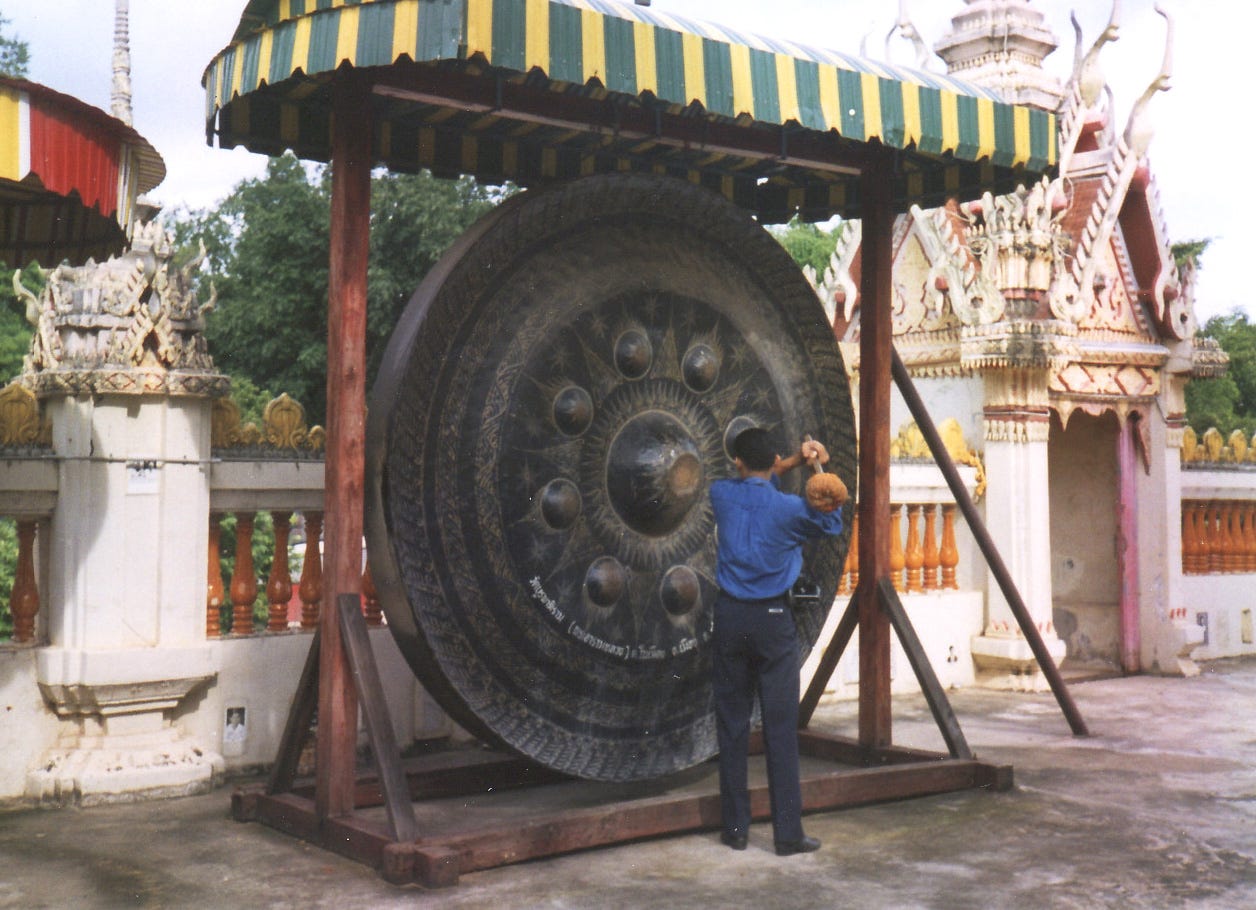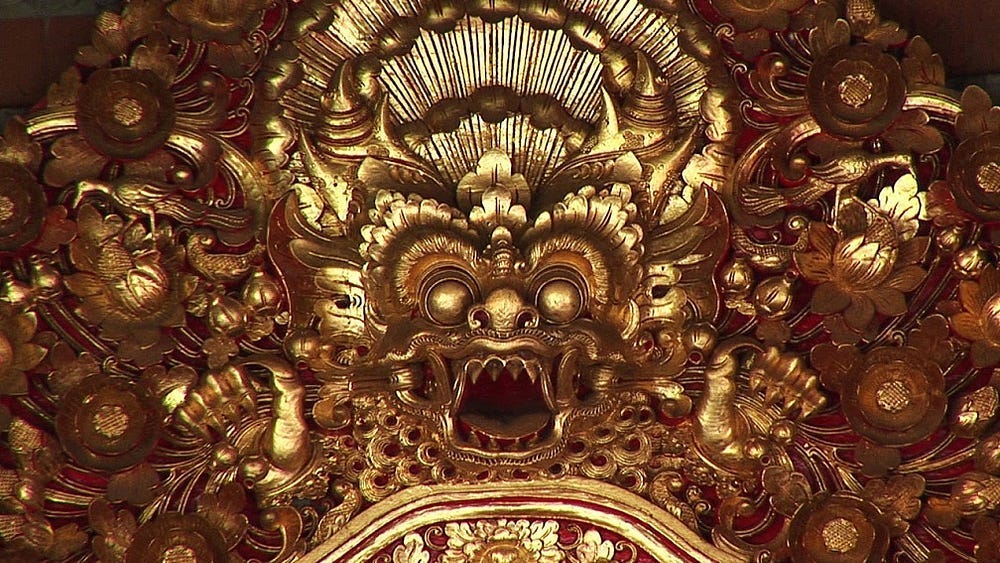The Creator Economy, Ancient and New
How much is enough?
True story, Word of Honor: Joseph Heller, an important and funny writer now dead, and I were at a party given by a billionaire on Shelter Island.
I said, “Joe, how does it make you feel to know that our host only yesterday may have made more money than your novel ‘Catch-22’ has earned in its entire history?”
And Joe said, “I’ve got something he can never have.”
And I said, “What on earth could that be, Joe?”
And Joe said, “The knowledge that I’ve got enough.” Not bad! Rest in peace!
-Kurt Vonnegut
One of the things that makes me happiest is when I see an artist doing well for themselves. To me, this doesn’t mean they’re rich or famous. It simply means that they aren’t struggling. Or that their struggle doesn’t impede with them being able to devote themselves to what they love.
Make me one with everything
A monk walks up to a hot dog stand. The guy asks, "What can I get you?"
The monk answers: "Make me one with everything."
In Bangkok on my way to Passport Bookshop, I pass by a massive wat. A wat is a Buddhist temple. Near the wat are shops selling monk supplies. One shop is selling enormous gongs wrapped and ready. Big, big gongs. I can see myself walking off with one of these beautiful things. I know they weigh a hundred pounds. My joy would carry that hundred pounds. The strength of my gong-owning happiness knows no bounds.
Earlier, wandering Chinatown, I kept creeping into shops selling bonafide antiquities—Grecian urns and carvings from stone age England, statues of buddhas and gods, ceremonial masks from New Guinea and Indonesia. I wanted everything. Make me one with everything.
Seeing the pieces, I thought of the generations of artisans and craftsmen who made these things. I thought of the world they belonged to. I like that world. That’s why I’d want to buy everything—to surround myself with reminders that I am a part of a creative world of devoted artisans.
In one shop there were ancient wall tapestries of women beneath various animals – an elephant, a horse – surrounded by ritual text. Old dirty pictures, maybe, or some charmed kerchief to give a guy vigor. The same shop had walls lined with wooden carved penises of all sizes. After noticing this collection, I regard the shy, demure shopkeeper differently.
Bonafide samurai suits of armor stand with "You break, you buy" placards. I guess even armor gets old enough to be fragile.
I go back to one shop, telling myself: Stephen, get that vajra. You want it. But when I looked at the object up close, I thought, why not just get a new one? This old one's sort of bent. I think about the life of these ancient ritual objects. Been in a temple and abandoned? Raided? Maybe loved and celebrated forever, then given away or sold?
I see a statue – Bhairava, I'd guess – a wrathful, fierce god in yab-yum, standing million-armed and terrible. That's something I want in my room. Astounding. Worthy of the term awesome. I think of the consort coupled with that deity – what’s her experience to be paired with that demon face staring at her? In that face she sees a fierceness for which she is the perfect match. True inner wildness. Yes, yes.
"Can you tell me anything about that one?"
She doesn't know about him.
"How much?"
"300,000 baht."
I know that's too much, but I nod thoughtfully and calculate the conversion rate. Ten thousand dollars. Not to say it isn't worth it. But no – that isn't how I want to measure these things. (I bought my prized I Ching coins off eBay, after all.) On the other hand, it is truly art. I just wish that the money could go to the artist, not this random collector.
Art in the marketplace
I consider these high-priced antiquities pieces of art. But the marketplace they’re a part of is too far removed from the artist or craftsman themselves. The artist’s motive was not to get rich. Making itself is an act of richness.
When I see an artist with their pieces for sale in a shop or with a show in a gallery, it joys me to see them doing well. That's a good life – they’ve found a way to align things that will always be awkward pairings: the marketplace, a calling, truth and beauty.
I am most moved when I come across an artist whose work doesn't particularly speak to me, artists I've never heard of. I love the fact that they’re doing something that doesn’t speak to me because it nevertheless shows me a world I want to be part of.
That simple life is my goal. Not fame, not a permanent notch on a bestseller list, but to have my place in the marketplace, my wares for sale. I have some things available if you happen to pass by and something strikes your fancy (like this book, which I co-wrote along with David Roe in a recent collaboration under the name Harlan Hunt). In my shop, I have cheap stuff and costly stuff. Something for everyone, if you're so inclined. Thanks for stopping by!
Chinatown surprised me with its abundance of automobile parts shops. I wonder what will happen to these once electric vehicles take over. Something feels so right about a neighborhood of small machine shops where the owners get their hands dirty, where there’s a guy out front hammering on a driveshaft, old guys sitting motionless but not unjoyful on a bench outside in the overbearing heat and humidity of early morning next door to a hair salon and a small grocery store.
The smell of cooking chicken, motorbike exhaust, lemongrass, and drain water.
Neither enlightened nor dark. Trending toward enlightened.
I didn't buy the vajra or the giant gong or the ancient dirty pictures or any suits of armor. I reassured myself I don't need to own everything I love. I don’t need to pay for things to surround myself with to tell me what I am. I did, however, buy a few small things. Things that were made by craftsmen in this era, things that spoke to a calmer part of me.
The freedom of choosing a path and walking it no matter what
When I was just starting out as a writer, I was sure that I needed to hit it big. Only that would do.
Now, what I want is freedom. Being a billionaire isn’t freedom. Being devoted is freedom. The inner journey knows no bounds.
The mechanic with his small shop knows this better than many would-be artists. Sell parts. Bang on metal. Drum your drum all day. No explanation needed.
How can I live without you?
Come up to me, love,
Out of the river, or I will
Come down to you.
-from 'To the Muse' by James Wright
Going down to the river to meet the muse entails getting down and dirty. It’s about giving up something lesser to receive something greater. Dropping personal baggage and humbling oneself to do the work required—whatever it takes.
I get into fitful states when I expect myself to produce something – and worse, when it's supposed to be good. It's a kind of impatience that eats itself.
Everyone has different coping mechanisms for how damn hard it can be sometimes to follow through on the desire to create. Some people are fair-weather artists – "I'll write when I feel like it.” Others believe they can only create at certain times of day. Some wait for perfect conditions that never arrive.
I've done a hell of a lot of just forcing it. Actually, I recommend this. It's gotten me over the need to be perfect. It gets me into the flow of something, even if sometimes that is a gritty-ass flow. It’s been valuable to me because it cultivated discipline and humility and prevented me from being limited by whether I feel like it.
It’s a special kind of medicine to be filled with the desire to create something beautiful and then to sit down and write drek and find nothing but drek available and to persist regardless. To push through until something better happens. Sometimes the muse comes to you, and sometimes you have to get down and dirty.
They say meditation isn't about being good at meditation – it's about being good at returning to a meditative state and choosing to practice meditation regularly. It doesn't help to beat yourself up for getting distracted. The thing to get good at is to notice when you get distracted and then to come back to the present moment. You don't transcend the need to return; you just get better at returning.
Same with art.



